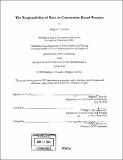| dc.contributor.advisor | Phillip L. Clay. | en_US |
| dc.contributor.author | Fennelly, Meghan C. (Meghan Cartier), 1978- | en_US |
| dc.contributor.other | Massachusetts Institute of Technology. Dept. of Urban Studies and Planning. | en_US |
| dc.date.accessioned | 2005-06-02T18:14:12Z | |
| dc.date.available | 2005-06-02T18:14:12Z | |
| dc.date.copyright | 2004 | en_US |
| dc.date.issued | 2004 | en_US |
| dc.identifier.uri | http://hdl.handle.net/1721.1/17681 | |
| dc.description | Thesis (M.C.P.)--Massachusetts Institute of Technology, Dept. of Urban Studies and Planning, 2004. | en_US |
| dc.description | Includes bibliographical references (p. 99-101). | en_US |
| dc.description.abstract | Practitioners in community-based organizations operate in an environment of difference. Often they are bridging relationships between low-income community members and government agencies or they are bonding diverse constituents to work together toward community change. Their work is often framed in this way: focused externally on the ways in which they work across difference to build unity. Missing from this framework, however, is the parallel internal focus on how individual identity affects practice. The community-based practitioner is likely working across racial, class and educational lines. In U.S. metropolitan areas, for example, a community-based worker can not escape the effects of racial segregation, discrimination and conflict that have left historical and lasting imprints on this country's urban neighborhoods. While a practitioner in this setting would not hesitate to point out resource disparities, the subject of racial disparity remains shrouded in ambiguity. In respect to race, working across difference requires a particular competency, commitment and responsibility. When the need to address race is left to individual initiative, its importance is undermined. The stories that inform this thesis describe particular moments in the work of community-based practitioners where race emerged as an important point of contention. Their reflections guide us through an exploration of what was done, what was learned, and what could be possible. Through this journey I forge a collected outline of the responsibility of race in community-based practice and offer guidelines to push us toward a vision of what is possible. | en_US |
| dc.description.statementofresponsibility | by Meghan C. Fennelly. | en_US |
| dc.format.extent | 101 p. | en_US |
| dc.format.extent | 4266065 bytes | |
| dc.format.extent | 4265874 bytes | |
| dc.format.mimetype | application/pdf | |
| dc.format.mimetype | application/pdf | |
| dc.language.iso | eng | en_US |
| dc.publisher | Massachusetts Institute of Technology | en_US |
| dc.rights | M.I.T. theses are protected by copyright. They may be viewed from this source for any purpose, but reproduction or distribution in any format is prohibited without written permission. See provided URL for inquiries about permission. | en_US |
| dc.rights.uri | http://dspace.mit.edu/handle/1721.1/7582 | |
| dc.subject | Urban Studies and Planning. | en_US |
| dc.title | The responsibility of race in community-based practice | en_US |
| dc.type | Thesis | en_US |
| dc.description.degree | M.C.P. | en_US |
| dc.contributor.department | Massachusetts Institute of Technology. Department of Urban Studies and Planning | |
| dc.identifier.oclc | 56394483 | en_US |
